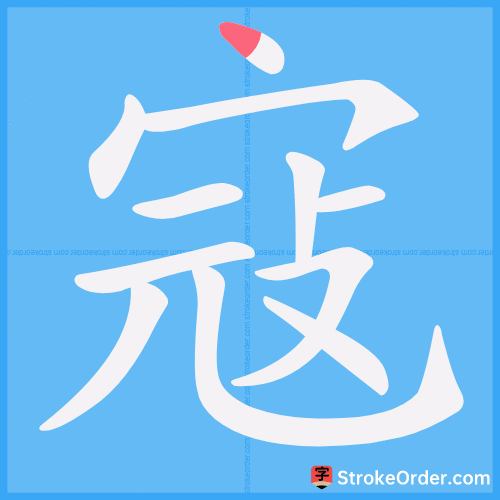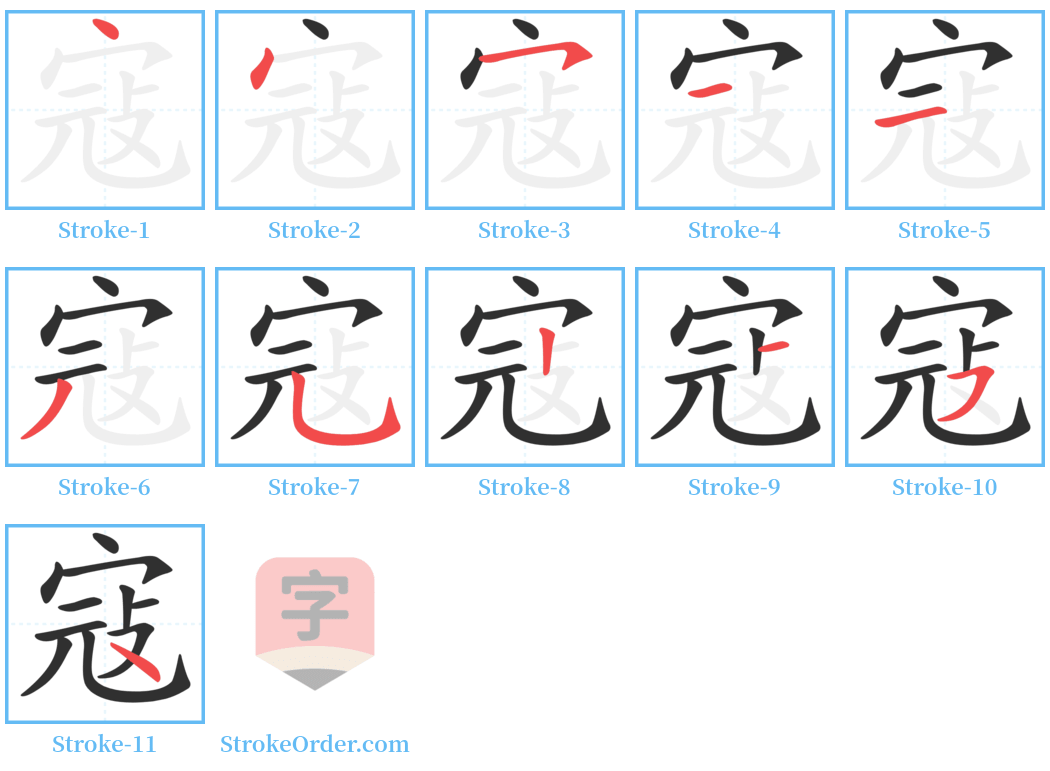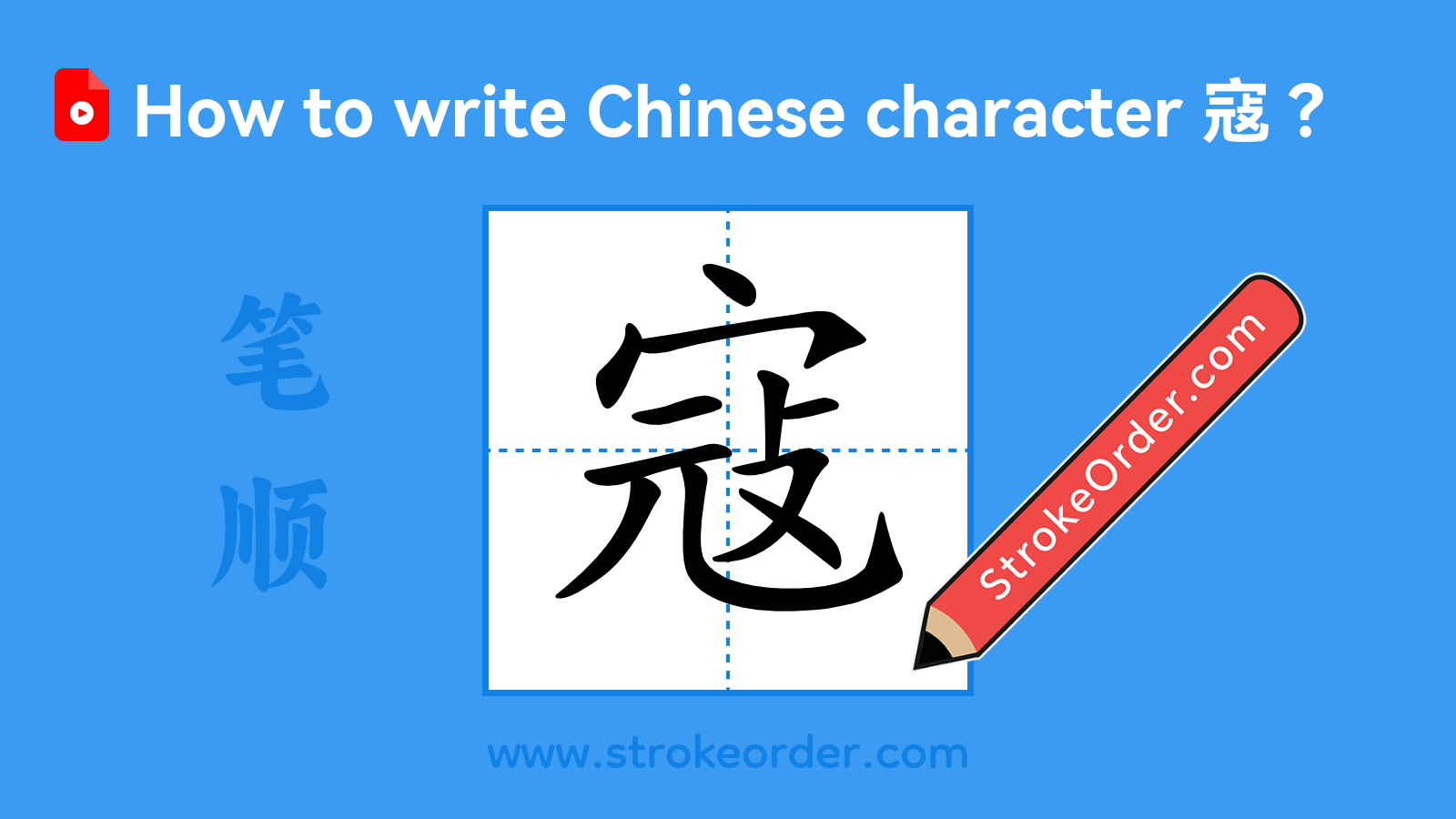寇 Stroke Order
Animated Stroke Order of 寇

Stroke Order Diagrams for 寇

Step-by-Step Handwriting Guide for 寇

Learn to Write Chinese Characters with Video Tutorials
Watch the video of writing the Chinese character "寇", learn the correct stroke order (笔顺) of the character "寇", and master the standard way of writing the character "寇".

Free Printable Handwriting Practice with Stroke Order: 寇
Printable Writing Practice Worksheet of "寇" in Portrait Orientation (Tian Zi Ge)

Printable Writing Practice Worksheet of "寇" in Landscape Orientation (Tian Zi Ge)

Information of 寇
Pinyinkòu
Radical
宀
Strokes
11 strokes
Usage
★★★★★
Definition
bandit
寇 [kòu]1. 腰匪,侵略者,亦指敌人。 Bandit, invader; also refers to an enemy.2. 侵略者来侵犯。 Invader comes to invade.3. 姓。 A surname.---寇 [kòu] (verb)- 本义: 入侵; 侵犯Original meaning: invade; infringe- 造字法: 会意。从宀( mián),表示与室家房屋有关,从元(人),从攴( pū),表示持械击打。意思是手持器械的人,侵犯到房子里来打人。Word formation: Ideographic. It is composed of the semantic component 宀 (mián), indicating a relationship with houses, and the components 元 (person) and 攴 (pū), indicating one who wields a weapon. The meaning is that a person holding a weapon invades a house to attack.1. 同本义 ([En.] invade; plunder) Same original meaning: to invade; to plunder.引: 1. 《说文》:寇,暴也。与败贼同义(朋侵)。 "Shuōwén": "Kòu" means violence, synonymous with 'defeated bandit'.2. 《书·舜典》:寇贼奸宄。传: “群行攻劫曰寇。”郑注: “强取为寇。” "Book of Documents": Bandits and thieves. The commentary indicates that collectively attacking and robbing is called "kòu".3. 《左传·文公七年》:凡兵作于内为乱,于外为寇。 "Zuo Zhuan": Any soldiers causing chaos inside are 'rebels', while those from outside are 'invaders'.4. 《吕氏春秋·贵公》:大兵不寇。 "Lüshi Chunqiu": Large armies do not invade.5. 《盐铁论·本议》:匈奴背叛不臣,数为寇暴于边鄙。 "Discourses on Salt and Iron": The Xiongnu rebelled against their sovereign and repeatedly acted as invaders on the borders.6. 《资治通鉴》:吐蕃发十万兵寇西川。 "Zizhi Tongjian": The Tubo sent 100,000 troops to invade Xichuan.例: 如: 寇戎(来犯的敌军); 寇虐(侵掠残害之行)寇钞(攻劫掠夺); 寇剽(抢劫); 寇钞(亦作“寇抄”。劫掠); 寇攘(劫掠; 侵扰); 寇窃(抢劫; 盗窃) For example: Kòu-róng (invading enemy forces); Kòu-nüè (acts of pillaging and harming); Kòu-chāo (robbery and plunder); Kòu-piāo (to loot); Kòu-jiā (to rob); Kòu-qiè (to steal; to rob).---寇 [kòu] (noun)1. 入侵者 ([En.] invader) Invader.引: 1. 杜甫《登楼》:西山寇盗莫相侵。 Du Fu: "Do not let the bandits of the western mountains invade."2. 敌人 ([En.] enemy) Enemy.引: 1. 《资治通鉴》:岂可复留此残寇,使长为国家之忧者。 Zizhi Tongjian: "How can we leave these remaining enemies to be a long-term concern for the nation?"3. 贼兵,敌军 ([En.] foe) Foe.引: 1. 《墨子·公输》:在宋城上而待楚寇矣。 Mozi: "Wait for the Chu bandits while at Song city."4. 盗匪 ([En.] bandit) Bandit.引: 1. 宋·文天祥《指南录后序》:北与寇往来其间。 "Guide Book Postscript": "The north often interacts with bandits."例: 如: 寇逆(贼寇,叛逆); 寇劫(指行劫的群盗); 寇戎(匪患与战争); 寇奸(寇贼奸宄) For example: Kòu-nì (bandits and rebels); Kòu-jié (groups of robbers); Kòu-róng (banditry and warfare); Kòu-jiān (banditry and treachery).5. 姓 A surname.
bandits
roving bandit / rebel band
Japanese aggressors / Japanese invaders
Thief
minister of criminal justice (official rank in imperial China)
cornered enemy
Enemy
Outsider
Jin Kou
Pirate
see 成則為王,敗則為寇|成则为王,败则为寇[cheng2 ze2 wei2 wang2 , bai4 ze2 wei2 kou4]
Japanese pirates (in 16th and 17th century)
Input Method for 寇
Pinyinkou4
Wubi
pfqc
Cangjie
jmue
Zhengma
wdix
Four Corner
30214
Unicode
U+5bc7
Same Pronunciation Characters
口叩寇扣抠眍蔻摳瞘筘芤釦剾彄劶怐敂宼冦窛蔲滱瞉簆鷇廤㔚㓂㰯㲄㽛䳟䳹
Same Radical Characters
宁它宅宇守安宋完宏宗官宙定宛宜宝实宠审客宣室宦宪宫宰害宴宵家容宽宾宿寂寄寅密寇富寒寓寝寞察寡寥寨宓宕宥宸寐寤寮寰宄宮寢實寧審寫寬寵寶宀寚寳寎寀宬宲寷寉宖寣寏宺寭宊寋寖宑宭寠寯宼寛宻寕寍寜寗寴寑寈宆宂
本文来自秋枫残霜投稿,不代表汉字笔顺中文网英文版立场,如若转载,请注明出处:https://www.strokeorder.cn/strokeorder/21325.html

 微信扫一扫
微信扫一扫 